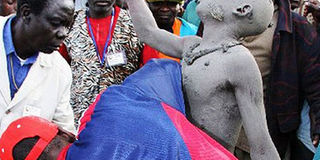Why key rite of passage is slowly losing its meaning

Circumcisers perform the cut on an initiate, smeared with mud at Musikoma village in Bungoma. PHOTO | FILE | NATION MEDIA GROUP
What you need to know:
- To this day, circumcision songs are not meant for public entertainment, though they have now been so watered down they no longer have any cultural or other value.
- In the early days, no child brought up in a Christian homestead was supposed to be outdoors when the pre-circumcision songfests were in progress.
- Jews circumcise their male children eight days after birth in strict accordance with religious law, while Muslims do it any time before the age of 10 years.
Until I became an adult, my experience of the circumcision rite consisted of three distinct episodes, all of them coloured by the fact that my parents were staunch Christians who would not brook any “pagan” rites or practices in our household. In short, during my childhood, I grew up knowing precious little about the revered rite of passage into adulthood.
The first painful episode occurred when I mistakenly happened to be outdoors on a night when circumcision song-and-dance was in full swing. I heard my “pagan” fellow villagers, particularly elderly women, utter words that, to this day, I dare not repeat in polite company. One of them referred to the female genitalia in very raw fashion.
When I went home, and in the presence of my siblings, loudly asked what it meant, the immediate result was a lesson I have never forgotten; the scar from the burning firewood hurled at me still decorates my leg.
The second episode was the night my older sister broke all the unspoken rules and, under peer influence, attended one of those nightlong dances when all inhibitions were cast aside and no word was taboo.
To this day, circumcision songs are not meant for public entertainment, though they have now been so watered down they no longer have any cultural or other value.
CIRCUMSICION PERIOD
Songs that once could only be sung during the circumcision period are liberally belted out by drunks to amuse their mates.
In the early days, no child brought up in a Christian homestead was supposed to be outdoors when the pre-circumcision songfests were in progress. In fact, during that whole period, a curfew was imposed on my family and we could not venture outside. It also happened that my old man owned an oak-panelled monstrosity of a radio which used a rechargeable battery.
When at full-blast, you could not talk among yourselves let alone hear what was going on outside. So when my sister went out that night, both livid parents were waiting for her to come home. She got the thrashing of her life.
The third episode was, of course, my own rite of passage of which there is little to relate because when we came of age, my brothers and I, each in turn, went to hospital one morning and came back in a matter of hours.
Two weeks later, we were healed, and during that time my old man forbade any non-family to enter the compound. In short, ours was a mere surgical procedure under local anaesthesia, spared of any counselling — or torture — from “care-givers”. This last brings me to the point of this lengthy reminiscence.
CARE-GIVERS
Of late, there have been reports of boys undergoing the cut and either dying of infections due to the unhygienic procedures carried out by quacks, or being tortured to death by the so-called care-givers.
There have also been reports of the initiates being recruited and forced to take oaths by members of proscribed criminal gangs in the Mt Kenya region. The gangsters also extort money and food from the parents.
What this amounts to is that an ordinary rite of passage has not only been commercialised, it has become a source of friction between those who believe in adherence to customs and those whose religious beliefs disagree with traditional practices.
The traditionalists hold that the Church has no role to play in the ritual and should not be counselling the initiates in the ways of the tribe, but the churchmen believe that to allow the traditionalists exclusive access to initiates is to take a step into the dark past. [Incidentally, nothing has been said about the abominable female genital mutilation that has no redeeming features whatsoever whether on cultural or health grounds. However, because a number of communities in Kenya still practise it clandestinely, the less said about the matter here, the better].
INCURABLE INFECTIONS
But just what is circumcision in the first place and what role does it play in the identity of a community? The removal of the foreskin is a mere surgical procedure; the significance lies elsewhere.
In many African societies, this rite is a milestone, for it marks a transition from boyhood to adulthood. At least this was the case in the past though today it has become a mere formality.
In other societies, it has religious significance. Jews circumcise their male children eight days after birth in strict accordance with religious law, while Muslims do it any time before the age of 10 years.
Another justification, which is growing in importance, is that circumcision has health benefits. In these days of incurable infections like HIV, it has been found out that the removal of the foreskin helps keep the virus at bay. It is still not clear how this happens, but international health organisations are wisely advocating the cut as one of the strategies to combat the spread of Aids.
The efficacy of this intervention is still on trial, so nobody should go dogging around thinking that he is assured of some kind of immunity.
Mr Ngwiri is a consultant editor ([email protected])





